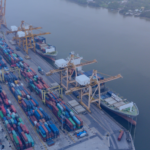
Recycled materials play a significant role in global decarbonization efforts, particularly in the carbon-intensive steel and aluminum sectors. So, the recycled materials industry has taken a keen interest in the Global Arrangement on Sustainable Steel and Aluminum negotiations between the European Union (EU) and the U.S. The goal of these discussions was to incentivize trade in low-carbon steel and aluminum, while also addressing global overcapacity in these two sectors. Set in place on Oct. 31, 2021, the agreement suspended the Section 232 tariffs on steel and aluminum imports from the EU, in addition to retaliatory measures imposed by the EU on certain U.S. exports, for two years through the end of 2023. The U.S. imposed a temporary tariff-rate quota (TRQ) system that would allow for historical levels of EU imports to enter the U.S. market tariff free.
Negotiators had initially expected to reach a final agreement by Oct. 31 of this year, but negotiations continue, as the sides remain far apart. The White House and European Commission issued a joint statement detailing recent discussions on the Global Arrangement, including that “substantial progress” has been made related to identifying the sources of non-market excess capacity. However, the statement did not provide further details on progress on the Global Arrangement discussions centered on trade in low-carbon steel and aluminum. The statement indicates that negotiations will continue for an additional two months through the end of the year.
One concern that could potentially stall negotiations is an agreement on how to define “green steel.” U.S. steelmakers are the global leader in the production of low carbon steel, with more than 70 percent of new steel produced using energy-efficient and lower emissions electric arc furnaces (EAFs). EAF steelmaking is a clean, innovative and energy efficient process that allows steelmakers to produce high-quality steel from 100 percent recycled material. While alternative steel standards may claim to be “green,” in reality, certain standards create a “sliding scale” that creates a dual standard that allows for high-carbon steel to be prioritized over low-carbon steel using recycled materials.
The recently released Global Steet Climate Council (GSCC) Steel Climate Standard levels the playing field among integrated and electric arc furnace steelmakers, recognizing the key role that recycled steel plays to meet decarbonization goals in the decades ahead. Producing new steel from recycled context requires 60 percent less energy, while simultaneously reducing CO2 emissions by 58 percent, compared with producing steel using new materials. For every metric ton of recycled ferrous used for steel production, steelmakers avoid using: 1.5 metric tons of CO2 emissions, 1.4 metric tons of iron ore, 740 kg of coal, 120 kg of limestone.
The U.S. government has not yet announced if the TRQ system will continue beyond Jan. 1, 2024. If the system does not continue, it could lead to reimposition of the U.S. tariffs of 25 percent on steel and 10 percent on aluminum from EU producers, as well as retaliatory measures on U.S. exports into the EU.

Recycled materials play a significant role in global decarbonization efforts, particularly in the carbon-intensive steel...